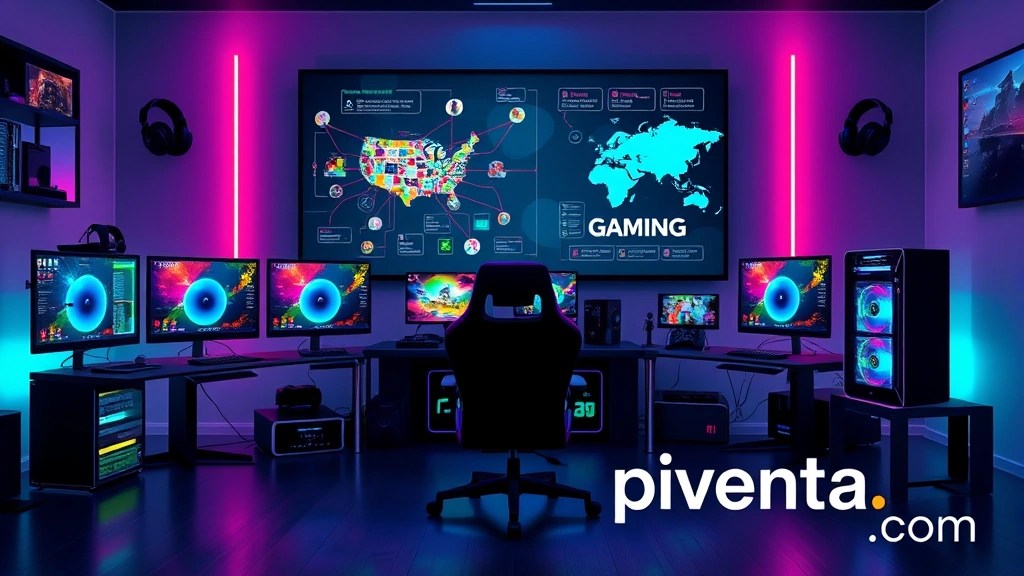Ever dreamt of playing your favorite games with zero lag, crystal-clear voice chat, and a squad that always has your back? Well, my friend, that’s not just a dream – it’s the power of a solid gaming network. In the US, where competitive gaming and casual hangouts are both huge, having a network that keeps up with your passion is key. But how do you even start building one? It might sound a bit techy, but trust me, it's totally doable.
This isn't just about plugging in an Ethernet cable and hoping for the best. We're talking about optimizing your entire setup, from the router tucked away in your living room to the friends you game with online. Let's dive in and transform your gaming experience from "meh" to "OMG, that was epic!"
Why a Strong Gaming Network Rocks
Think about it: what’s more frustrating than a perfectly aimed headshot turning into a missed opportunity because of a sudden lag spike? Or trying to coordinate a raid with your buddies, and half the time you can’t hear them? A good gaming network isn't just a luxury; it's a necessity for serious gamers and casual players alike. It’s about more than just speed; it’s about stability, low latency, and a seamless connection that lets you focus on the game, not the technical glitches.
The Benefits You’ll Notice Right Away
- Lag-Free Gameplay: This is the Holy Grail. No more teleporting enemies or delayed reactions.
- Crystal-Clear Communication: Hear your teammates, strategize effectively, and celebrate those wins without static or dropouts.
- Faster Downloads & Updates: Spend less time waiting for the next big patch and more time actually playing.
- Reliable Streaming: If you're into streaming your gameplay on Twitch or YouTube, a stable network is non-negotiable.
- Smoother Multiplayer Experience: Whether it's a massive online battle royale or a co-op adventure with a few friends, everything just works better.
Laying the Foundation: Your Internet Service Provider (ISP)
Before you even think about fancy hardware, you need a solid internet connection. In the US, you have a lot of options, from cable to fiber to satellite. But for gaming, not all connections are created equal. You’re looking for speed, but more importantly, low latency (ping).
Choosing the Right ISP Plan
When talking to ISPs, don't just ask about download speeds. Ask about upload speeds too, especially if you plan to stream. And inquire about typical latency to gaming servers. Fiber optic connections generally offer the best performance for gaming due to their symmetrical speeds and lower latency.
Here’s a quick comparison of common internet types in the US:
| Internet Type | Pros for Gaming | Cons for Gaming |
|---|---|---|
| Fiber Optic | Highest speeds, lowest latency, symmetrical upload/download | Limited availability in some areas, potentially higher cost |
| Cable | Widely available, good speeds, decent latency | Asymmetrical speeds (upload usually slower), can experience congestion during peak hours |
| DSL | Widely available, generally cheaper | Lower speeds, higher latency, not ideal for competitive gaming |
| Satellite | Available in rural areas | Very high latency, low speeds, not suitable for real-time online gaming |
Pro Tip: Always check what your neighbors are using and their experiences. Word-of-mouth can be gold!
Gearing Up: Essential Hardware for Your Network
Okay, you’ve got a decent internet plan. Now, let’s talk about the actual gear that makes your gaming network sing. This is where many gamers make crucial mistakes, often relying on outdated or basic equipment.
Your Router: The Brain of Your Network
This is arguably the most important piece of hardware. The router you got from your ISP might be "good enough" for browsing, but for gaming, you need something more robust.
What to Look for in a Gaming Router:
- Wi-Fi 6 (802.11ax) or Wi-Fi 6E: These are the latest standards. They offer faster speeds, better efficiency, and can handle more devices at once.
- MU-MIMO (Multi-User, Multiple-Input, Multiple-Output): This technology allows your router to communicate with multiple devices at the same time, rather than one after another. This is crucial if you have a household full of gadgets.
- Quality of Service (QoS): This feature lets you prioritize gaming traffic over other activities (like streaming Netflix or downloading large files). It ensures your game always gets the bandwidth it needs.
- Number of Ethernet Ports: For the absolute best connection, you want to use a wired connection. Make sure your router has enough Gigabit Ethernet ports for your gaming PC/console and any other critical devices.
- Processor & RAM: Just like a computer, a router needs a good processor and enough RAM to handle heavy traffic without breaking a sweat.

Ethernet Cables: The Unsung Heroes
Seriously, ditch Wi-Fi for your main gaming rig if you can. A wired connection is always superior for gaming because it offers lower latency and a more stable connection.
Choosing the Right Cable:
- Cat5e or Cat6: These are the most common and perfectly fine for most home networks. Cat6 offers slightly better performance over longer distances.
- Shielded vs. Unshielded: For home use, unshielded (UTP) cables are usually fine. If you’re running cables near electrical interference, shielded (STP) might be beneficial, but they are also stiffer and more expensive.
Powerline Adapters: A Wired Alternative
Can’t run an Ethernet cable across your house? Powerline adapters might be your next best bet. They use your home’s electrical wiring to transmit network data. It’s not as good as a direct Ethernet cable, but it’s often much better than Wi-Fi, especially through multiple walls.
Mesh Wi-Fi Systems: For Larger Homes
If you live in a larger home with dead zones, a mesh Wi-Fi system can provide consistent coverage throughout. These systems use multiple units to create a single, seamless network. While they offer great coverage, some might introduce a tiny bit more latency compared to a single, powerful router in a central location. Look for mesh systems that support a dedicated backhaul for gaming.
Optimizing Your Network Settings
Hardware is just one piece of the puzzle. Software settings can make a huge difference in your gaming experience.
Router Settings: Digging Deep
Log into your router’s administration panel (usually by typing its IP address, like 192.168.1.1, into your browser). This is where the magic happens.
Key Settings to Tweak:
- QoS (Quality of Service): As mentioned, prioritize your gaming devices. Some routers even have specific "Gaming Mode" presets.
- Port Forwarding: Some games require specific ports to be open for optimal multiplayer performance (e.g., for hosting a server or getting an "open NAT type"). Be careful here, as opening too many ports can be a security risk. Only forward ports specific to your game.
- UPnP (Universal Plug and Play): This feature automatically opens and closes ports as needed. While convenient, it can sometimes be a security concern. Many gamers prefer to disable it and manually forward ports for better control.
- Firmware Updates: Always keep your router’s firmware up to date. Manufacturers often release updates that improve performance, stability, and security.
Your Gaming Device Settings
Whether you're on a PC, PlayStation, Xbox, or Nintendo Switch, there are settings you can optimize.

PC Gaming Optimization:
- Wired Connection: Again, use Ethernet!
- Disable Background Downloads: Make sure Steam, Epic Games Store, and Windows Update aren't downloading in the background during your gaming session.
- Network Driver Updates: Keep your network adapter drivers updated.
- Windows Game Mode: Enable Game Mode in Windows settings. It helps prioritize your game’s resources.
Console Gaming Optimization:
- Wired Connection: Same rule applies.
- Test Network Connection: Utilize the built-in network test tools on your console to check speed and NAT type.
- Clear Cache: Sometimes clearing your console’s cache can resolve connectivity issues.
Building Your Gaming Community
A network isn't just about wires and Wi-Fi; it's also about the people you connect with. In the US, there are countless ways to find fellow gamers and build your squad.
Where to Find Your Crew:
- Discord Servers: This is probably the biggest hub for gamers. Find servers dedicated to your favorite games, streamers, or gaming communities.
- Online Forums & Subreddits: Websites like Reddit have massive communities for every game imaginable.
- In-Game LFG (Looking For Group) Features: Many modern games have built-in tools to help you find teammates.
- Local Gaming Stores & Events: Check out local game shops or conventions in your area. You might be surprised how many gamers live right around the corner!
- Friends of Friends: The classic way! Ask your current gaming buddies if they know anyone else looking for a team.
Cultivating a Positive Gaming Environment
Once you’ve found your squad, keep it positive. Good communication, respect, and a shared passion for gaming will make your network stronger than any gigabit connection. Remember, it’s about having fun and enjoying the experience together.
Troubleshooting Common Network Issues
Even with the best setup, sometimes things go wrong. Here are quick tips for common problems.
My Ping is High!
- Check Other Devices: Is someone else streaming 4K video or downloading a huge file?
- Restart Router/Modem: The classic fix, but often effective.
- Check for Interference: Cordless phones, microwaves, and even baby monitors can interfere with Wi-Fi.
- Contact ISP: If all else fails, it might be an issue on their end.
My Voice Chat is Cutting Out!
- Check Microphone: Is your mic working properly?
- Internet Congestion: Could be a sign of high ping or packet loss.
- Router QoS: Ensure voice chat is prioritized.

I Can’t Connect to My Friends!
- NAT Type: Ensure you both have an "Open" or "Moderate" NAT type. Strict NAT types can prevent direct connections.
- Firewall: Check if your firewall is blocking the game or voice chat.
- Server Issues: Sometimes, it’s not you, it’s the game server!
FAQ: Your Burning Questions Answered
Q1: Do I really need a gaming router? My ISP gave me one.
A1: While your ISP-provided router might get the job done for basic internet use, a dedicated gaming router offers features specifically designed to improve online gaming performance. These include better QoS controls, more robust processors, and advanced Wi-Fi technologies (like Wi-Fi 6/6E and MU-MIMO) that significantly reduce latency and improve stability during intense gaming sessions. Think of it as upgrading from a family sedan to a sports car for racing – both get you there, but one does it much better.
Q2: What's the ideal internet speed for gaming?
A2: For most online gaming, you don't need incredibly high download speeds – a stable 25-50 Mbps download speed is often sufficient. However, what's truly critical is low latency (ping) and stable upload speeds (especially if you plan to stream or host games). Fiber optic connections typically excel here. For streaming, you'll want at least 10-20 Mbps upload. Remember, consistency beats raw speed for gaming.
Q3: Is Wi-Fi 6 a game-changer for wireless gaming?
A3: Yes, Wi-Fi 6 (802.11ax) and Wi-Fi 6E are significant upgrades for wireless gaming. They offer lower latency, better efficiency, and can handle more devices simultaneously without performance degradation. While a wired Ethernet connection is still king for the absolute best performance, Wi-Fi 6 comes closer than previous Wi-Fi standards to providing a lag-free wireless gaming experience, especially in busy home networks.
Q4: Should I use a VPN for gaming?
A4: Generally, no. While VPNs offer security and privacy benefits, they often introduce additional latency (ping) because your data has to travel to the VPN server before reaching the game server. This can negatively impact your gaming performance. The only times a VPN might be beneficial for gaming are to bypass geo-restrictions, protect against DDoS attacks (if you're a streamer or competitive player targeted by such attacks), or if your ISP is throttling your connection.
Q5: What is "NAT Type" and why is it important for gaming?
A5: NAT (Network Address Translation) Type determines how your console or PC communicates with other players' devices over the internet.
- Open NAT: You can connect to any player and host games. This is ideal.
- Moderate NAT: You can connect to most players but might have issues with some and might not be able to host games.
- Strict NAT: You can only connect to players with Open NAT types and will likely have connectivity issues.
A Strict NAT type usually indicates a problem with your router's port forwarding or UPnP settings, restricting incoming connections.
Q6: How often should I restart my router?
A6: It's a good practice to restart your router and modem at least once a month, or whenever you experience connectivity issues. A simple restart can clear temporary glitches, refresh IP addresses, and improve overall network performance. Think of it as giving your network a quick brain reset.
Q7: Are gaming-specific Ethernet cables better?
A7: No, not really. While some cables are marketed as "gaming Ethernet cables," a standard Cat5e or Cat6 Ethernet cable will provide the exact same performance. The quality of the cable matters more in terms of durability and shielding, but there's no special "gaming" technology in the wires themselves that gives you an edge. Focus on getting a reliable, well-built cable of the appropriate category.
Level Up Your Game!
Building a robust gaming network might seem like a daunting task at first, but by breaking it down into manageable steps, you can significantly enhance your online gaming experience. From choosing the right ISP and investing in quality hardware to optimizing your settings and finding your ultimate squad, every piece contributes to a smoother, more enjoyable, and truly immersive gaming journey. So, what are you waiting for? Go forth, optimize your network, and dominate those leaderboards! What’s the first change you’re going to make to your gaming setup? Let’s get those wins!











